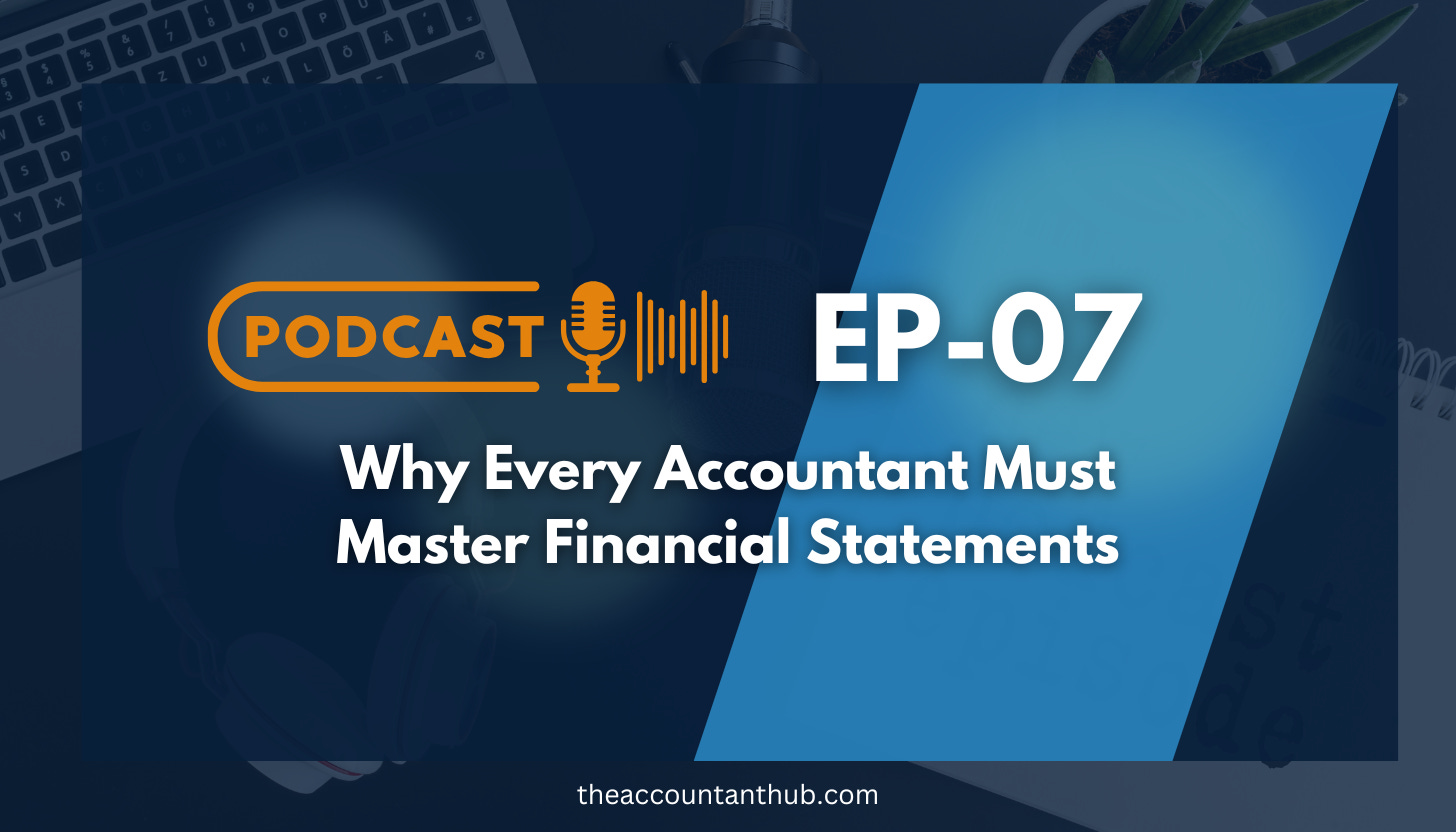📍 Mastering financial statements isn’t just about doing your job; it’s about understanding the complete story of a company’s health, its strategy, and even its future direction.
If you truly want to become a confident global accountant, this is the single most important skill you must start with. And in today’s episode of The Accountant Show, I want to share exactly why financial statements matter, why you should prioritize them, and how you can start mastering them.
My Early Days With Financial Statements
Hello dear accountants, this is your friend Divyesh Dave, and welcome to another episode of The Accountant Show—the podcast of our community, The Accountant Hub.
Here we talk about skills, mindsets, and strategies you need to grow your career with clarity and confidence.
Let me take you back to my early career. When I was an assistant accountant, I was doing the basics—matching trial balances, reconciling ledgers, entering invoices, preparing financials. I thought accounting was all about balancing books and data entry.
But the first time I sat in a client meeting with senior chartered accountants, I realized something big:
👉 The financial statements weren’t just numbers.
👉 They were a language of business.
👉 They told a story about performance, risks, and opportunities.
And I was just compiling the raw data that others were interpreting!
That moment shifted something inside me. I wanted to be the one interpreting and communicating those insights—not just preparing them.
It didn’t happen overnight. Early in my career, I had a mixed profile—taxation, audit, admin, accounting. I couldn’t focus deeply. But years later, with mentors guiding me, I restarted my learning journey. And honestly? That decision changed everything.
It helped me move from day-to-day accountant to becoming a global finance professional—and now I’m working towards being a finance leader.
And I believe the same shift can happen for you.
The Four Pillars of Financial Statements
Before we go into why mastering them matters, let’s refresh the basics:
Income Statement (Profit & Loss Account)
Shows company performance over a period. Revenues – Expenses = Net Income.
Balance Sheet (Statement of Financial Position)
A snapshot of the company’s health at a point in time. Assets = Liabilities + Equity.
Statement of Cash Flows
Explains how money moves in and out of the business across operating, investing, and financing activities.
Statement of Shareholders’ Equity
Tracks how equity changes over time—retained earnings, new investments, dividends, etc.
Think of these four as interconnected chapters of the same story. Each one adds context. Each one is necessary.
Why Every Accountant Must Master Them
Here are the five strongest reasons:
Strategic Decision-Making
Financial statements guide leaders on expansion, cost-cutting, and resource allocation. If you can interpret them, you move from being a “number cruncher” to a strategic business partner.
Valuation & Investment
Analysts and investors use these statements to value companies. When you master them, you can confidently engage in high-level discussions and add value.
Risk Management
Close reading reveals issues like liquidity risks, high debt, or declining margins. Spotting these early positions you as a trusted advisor to management.
Regulatory Compliance
Accurate reporting is not optional—it’s a legal requirement. Mastery builds credibility, keeps you compliant with IFRS/US GAAP, and protects your career.
Communication & Transparency
When you can clearly explain financials to investors, banks, or non-finance managers, you build trust. And trust leads to faster promotions and leadership opportunities.
Easy Steps to Elevate Your Skills
So how do you actually master financial statements? Here are four practical steps you can start today:
Understand Interconnections
See how net income flows to retained earnings on the balance sheet, and how that impacts cash flow. Train your eye to see the links.
Focus on Ratios, Not Just Numbers
Liquidity, solvency, profitability—ratios reveal the real story behind the numbers.
Track Trends Over Time
Don’t just read this year’s report. Compare 3–5 years of data. Look for horizontal and vertical patterns. That’s where insights emerge.
Practice With Real-World Examples
Download actual reports from listed companies. Analyze them. Interpret them. Apply theory to reality. That’s how skills stick.
My Journey and Your Next Step
I started as a “normal accountant” doing data prep. But by focusing on mastering financial statements, I became a global professional with higher confidence, higher income, and a clearer career path.
Now, inside my community The Accountant Hub, I’m running a US GAAP Fundamentals Series, where I break down concepts like this step by step. If you’ve ever wanted to master financial statements with clarity, this is the place for you.
👉 Simply join our VIP LinkedIn group here: YESDD.co/VIP
Recap
Financial statements are the language of business.
The four pillars are Income Statement, Balance Sheet, Cash Flow, and Shareholders’ Equity.
The five reasons to master them: decision-making, valuation, risk management, compliance, and communication.
The four steps to elevate skills: see interconnections, use ratios, track trends, and practice with real-world reports.
📍 Mastering financial statements isn’t just about passing exams. It’s about becoming a trusted professional who speaks the language of business confidently.
So start today—because the faster you master them, the faster you move from “accountant” to finance leader.
If you like this small insight please drop a comment below with: “I SPEAK THE LANGUAGE OF BUSINESS” to commit yourself to mastering financial statements. You can also share you understanding and any idea that comes to your mind as well.
And don’t forget to subscribe on Apple Podcasts and Spotify so you never miss an episode.
Thank you for joining me in this episode of The Accountant Show. Until next time — keep learning, keep growing, and keep connecting.
Your Friend
Divyesh Dave
Join the community » The Accountant Hub












